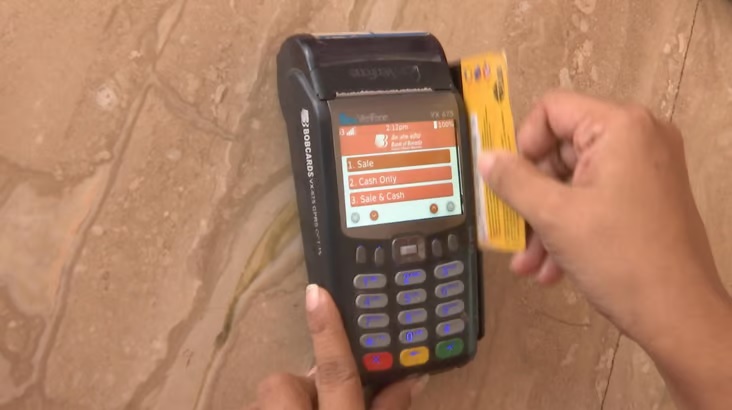The transition towards a cashless economy has been an important step for businesses, consumers, and financial institutions. A significant role in this shift has been the adoption of swipe machines. These devices, once viewed as optional, are now indispensable in the evolving landscape of transactions. They symbolise convenience, transparency, and security, all of which are crucial for a thriving cashless ecosystem.
This blog explores the role of swipe machines in shaping a cashless economy, with a particular focus on how they benefit small and medium enterprises (SMEs). It highlights their impact on enhancing SME banking services and ensuring seamless financial operations.
How do Swipe Machines Drive Financial Accessibility?
Swipe machines serve as a bridge between traditional cash transactions and digital payments. By enabling businesses to accept payments via credit or debit cards, these devices simplify transactions for both merchants and customers.
For SMEs, this accessibility is especially transformative. Businesses no longer need to rely solely on cash transactions, which often come with risks and logistical challenges. With swipe machines, they can offer customers a choice of payment methods, enhancing their overall shopping experience.
The Role in Expanding SME Banking Services
Swipe machines align closely with the objectives of SME banking. They allow businesses to maintain proper financial records, which is vital for availing loans and other financial services. Banks often assess a business’s transaction history to gauge its financial health. With swipe machines, SMEs can easily generate such records, thereby strengthening their credibility with financial institutions.
Seamless Transactions for Growing Businesses
Efficiency is a cornerstone of any successful business, and swipe machines are designed to deliver just that. They reduce transaction times, eliminate the need for manual cash handling, and ensure instant payment confirmations.
For SMEs, this means fewer operational bottlenecks and more time to focus on scaling their business. Furthermore, swipe machines integrate smoothly with existing systems, providing flexibility and adaptability for business owners.
Enhanced Security in a Cashless Framework
Security concerns often deter businesses from adopting digital payment methods. However, swipe machines offer advanced solutions. They are equipped with the latest encryption technology, ensures that customer data and financial information remain secure.
This aspect is particularly relevant for SMEs, which may need more resources to invest in standalone security systems. With swipe machines, they can safeguard transactions without additional overheads, contributing to their peace of mind.
Boosting Consumer Confidence
Customer trust is integral to the success of any business. Swipe machines foster this trust by offering a transparent and seamless payment experience. When customers know their transactions are secure and convenient, they are more likely to engage with a business repeatedly.
For SMEs, this translates to increased customer retention and a loyal client base. The availability of swipe machines also positions these businesses as modern and forward-thinking, which is increasingly appealing to today’s tech-savvy consumers.
Driving a Culture of Accountability
Swipe machines play an important role in promoting accountability among businesses. They enable real-time transaction tracking, making it easier for SMEs to manage their finances and comply with regulatory requirements.
This transparency is not just beneficial for businesses but also contributes to the broader goals of a cashless economy. By minimising the scope for under-the-table dealings, swipe machines pave the way for a more equitable financial environment.
Supporting Digital Transformation
The digital wave has swept across sectors, urging businesses to adapt and evolve. Swipe machines are a stepping stone for SMEs on this transformative journey. By embracing these devices, small businesses can align themselves with the broader digital transformation initiatives championed by various stakeholders.
This alignment not only enhances their operational efficiency but also positions them to tap into new growth opportunities in the cashless economy.
Simplifying the Merchant-customer Relationship
Swipe machines bring ease to the merchant-customer relationship by eliminating the need for exact change or multiple payment systems. This simplicity allows SMEs to cater to a diverse customer base without compromising on convenience.
Moreover, businesses that adopt swipe machines often report higher sales, as customers are not restricted by the cash they carry. This flexibility can be a significant growth driver for SMEs, encouraging them to invest further in technology.
Building a Resilient Business Model
The ability to adapt is essential for SMEs, especially in an ever-changing financial environment. Swipe machines help businesses build resilience by enabling them to accept payments regardless of external challenges, such as cash shortages.
This adaptability ensures that businesses remain operational and profitable, even in unpredictable circumstances. It also demonstrates the versatility of swipe machines as a tool for economic stability.
A Cashless Tomorrow: Swipe Machines Leading the Way
Swipe machines have emerged as a cornerstone of the cashless economy, seamlessly connecting businesses, consumers, and financial institutions. For SMEs, they offer a gateway to enhanced operational efficiency, improved security, and greater customer satisfaction.
By adopting swipe machines, businesses not only elevate their financial practices but also contribute to a cashless ecosystem that is transparent, efficient, and inclusive.
If you are looking to integrate advanced payment solutions, consider partnering with trusted SME banking services like HDFC Bank. They offer a range of services tailored to support SMEs on their journey towards success, ensuring you stay ahead in the cashless revolution.
